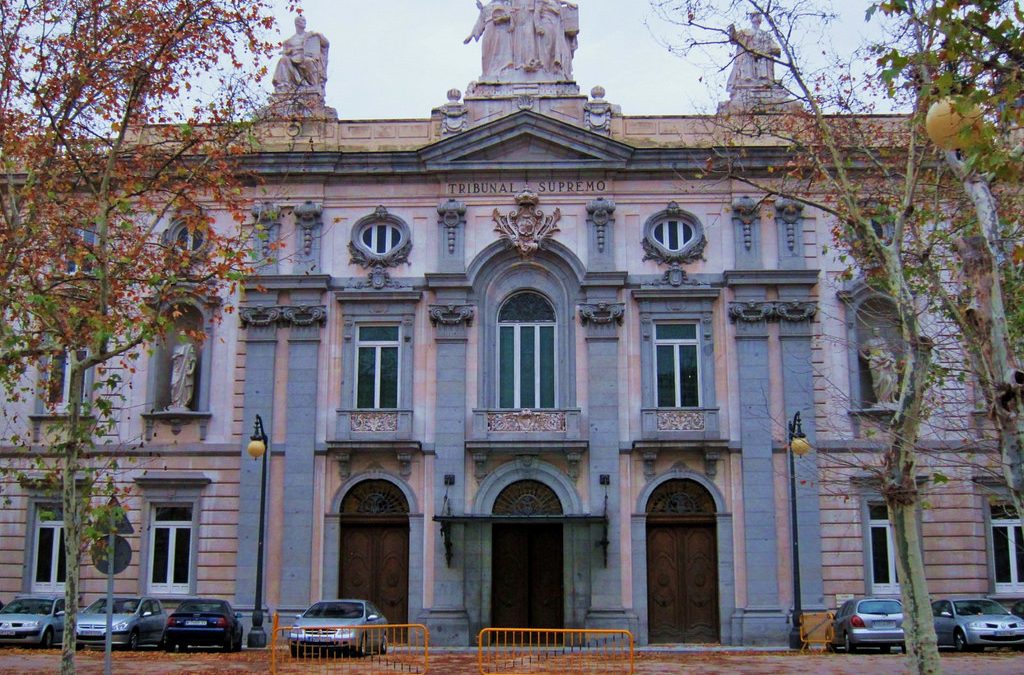Un nuevo horizonte se abre para los consumidores. El Tribunal Supremo decretó esta semana que finalmente debían ser las entidades las que soportaran la carga de los impuestos de las hipotecas firmadas con los clientes. Sigue leyendo y te contaremos cómo la justicia modificó su criterio y cómo puedes reclamar dichos impuestos.
¿POR QUÉ EL CAMBIO DE CRITERIO?
En febrero de 2018 el Tribunal Supremo se pronunciaba sobre quién debía hacerse cargo de pagar el impuesto de actos jurídicos documentados (normalmente, el importe más elevado de la factura), algo de lo que ya os hablábamos en nuestro blog. Anteriormente la jurisprudencia había decretado que debía ser el cliente quien soportara esta cantidad y nueve meses después, la jurisprudencia ha dado un volantazo para corregir su criterio y rectificarse. La primera consecuencia se vivió rápidamente en La Bolsa, con una caída bursátil en picado de más del 5% para entidades como Bankia, Bankinter o CaixBank y hasta un 2% para el Santander y BBVA. La agencia de calificación de riesgo Moody’s cifra en más de 4000 millones el impacto que pueden generar las reclamaciones que se lleven a cabo
En su resolución, el Supremo se ha pronunciado a favor del prestatario o cliente en la cuestión fundamental del asunto: La interpretación de la ley de transmisiones patrimoniales y actos jurídicos documentados. Este último concepto abarca documentos notariales o mercantiles tales como los préstamos hipotecarios y en febrero, la justicia decretó que correspondía al cliente. Aquello suscitó una ácida polémica sobre por qué se ordenaba exonerar a la banca de abonar este impuesto siendo este el único interesado en la inscripción de un acto jurídico como un préstamo en escritura pública. El motivo es que esa inscripción sería el instrumento para ejecutar la hipoteca si se diera una situación de impago. Ya que el prestamista debe ver protegidos sus intereses ante situaciones de insolvencia, debe correr de su cuenta tener ese privilegio. Por eso, debe ser la banca quien abone los gastos de inscripción y por ello, la justicia se ha desdicho del criterio que dictaminó en febrero.
Ocurre de forma opuesta con los gastos de cancelación de la hipoteca. En este caso, el principal interesado es el cliente y es él quien debe cargar con esta cuantía.

¿QUÉ DEBO HACER PARA RECLAMAR ESOS GASTOS?
Primeramente, la sentencia no especifica nada sobre si esta decisión tiene carácter retroactivo. Es de perogrullo que los bancos se tendrán que hacer cargo de los impuestos que generen aquellas hipotecas a partir de ahora. Pero ¿qué ocurre con las anteriores? Con total seguridad, todas aquellas firmadas durante los últimos cuatros años (desde 2014) serán susceptibles de ser reclamadas porque no habrían prescrito. Al no pronunciarse la justicia sobre las hipotecas firmadas con anterioridad al ejercicio fiscal de 2014, las asociaciones de consumidores piden ir más allá de ese periodo para que los bancos también abonen los gastos de dichos documentos. Por ejemplo, FACUA-Consumidores en acción entiende que así debería ser. Pero para ello, los expertos recomiendan realizar una reclamación extra judicial contra el banco. De esta manera, si se recibiera una respuesta negativa por parte de la entidad financiera, se podría acudir a la justicia ordinaria, ya que ante una reclamación de cantidad esta siempre entenderá que se han agotado todas las vías de conciliación previas.
¿Cuánto me deberían devolver?
Todo depende de cuanto sea el importe de la hipoteca y dónde se haya realizado la compra de la vivienda. Por lo tanto, hay que tener en cuenta el porcentaje que hay que pagar por los Actos Jurídicos Documentados. Por ejemplo, en lugares como Andalucía, Cantabria, Cataluña, Aragón, Comunidad Valenciana y las dos Castillas ese porcentaje asciende a 1,50%. En Asturias y Baleares, 1,20%; En Canarias y Madrid 0,75 y en Ceuta, Melilla, Navarra y País Vasco, 0,50%. Traducido en números, si la escritura de tu hipoteca asciende a 150.000 euros, la cuantía que podrías reclamar oscilaría entre los 750 y los 2250 euros.
¿Qué documentos tengo que presentar?
A través de la vía judicial (tras agotar la vía del acuerdo previo con el banco) el cliente deberá presentar la copia del préstamo hipotecario junto a las facturas de los gastos de notaría (Documentos que se encuentran en las propias escrituras de la hipoteca). Al tratarse de un caso de cláusulas abusivas, no habría restricciones temporales para iniciar los trámites para la reclamación.

HOW TO CLAIM THE BANK TO RETURN THE MORTGAGE TAXES?
The Supreme Court decreed this week that it should finally be the entities that bear the burden of taxes on mortgages signed with customers. Keep reading and we will tell you how justice modified his criterion and how you can claim these taxes.
WHY THE CHANGE OF CRITERION?
In February 2018 the Supreme Court ruled on who should take charge of paying the taxes of spanish documented legal acts. Previously the jurisprudence had decreed that the client should be the one who supported this amount and nine months later, the jurisprudence has rectify itself. The first consequence was experienced quickly in the stock market, with a plummeting stock market drop of more than 5% for entities such as Bankia, Bankinter or CaixBank and up to 2% for Santander and BBVA. The risk rating agency Moody’s figures in more than 4000 million the impact that can be generated by the claims that are carried out
In its resolution, the Supreme Court has ruled in favor of client in the fundamental issue of the matter: The interpretation of the law of property transfers and legal acts documented. This last concept covers notarial or mercantile documents such as mortgage loans and in February, the court decreed that it corresponded to the client. That led to a bitter controversy about why it was ordered to exonerate the bank to pay this tax being the only interested in the registration of a legal act as a loan in public deed. The reason is that this registration would be the instrument to execute the mortgage if there were a situation of non-payment. Since the lender must see his interests protected in situations of insolvency, it must be in his account to have that privilege. Therefore, it must be the bank who pays the registration fees and, therefore, the court has violated the criteria it ruled in February.
It happens in the opposite way with the cancellation expenses of the mortgage. In this case, the principal interested party is the client and it is he who must pay with this amount.
WHAT SHOULD I DO TO CLAIM THOSE EXPENSES?
First of all, the sentence does not specify anything about whether this decision is retroactive. Banks will support of the taxes generated by those mortgages from now on. But what about the previous ones? With total security, all those signed during the last four years (since 2014) will be susceptible to be claimed because they would not have prescribed. When justice is not pronounced on the mortgages signed prior to the fiscal year of 2014, the consumer associations ask to go beyond that period so that the banks also pay the expenses of said documents. For example, FACUA-Consumers in action understands that this should be the case. But for this, experts recommend making an extra judicial claim against the bank. In this way, if a negative response was received from the financial institution, it would be possible to go to the ordinary courts, since before a quantity claim it will always understand that all previous conciliation channels have been exhausted.
How much should they give me back? Everything depends on the amount of the mortgage and where the purchase of the home was made. Therefore, we must take into account the percentage that must be paid for the Documented Legal Acts. For example, in places like Andalusia, Cantabria, Catalonia, Aragon, Valencian Community and the two Castiles that percentage rises to 1.50%. In Asturias and the Balearic Islands, 1.20%; In the Canary Islands and Madrid 0.75 and in Ceuta, Melilla, Navarra and the Basque Country, 0.50%. Translated in numbers, if the writing of your mortgage amounts to 150,000 euros, the amount you could claim would range between 750 and 2250 euros.
What documents do I have to present? Through the judicial process (after exhausting the previous agreement with the bank), the client must present a copy of the mortgage loan together with the invoices for notary expenses (Documents found in the deeds of the mortgage itself). Being a case of abusive clauses, there would be no temporary restrictions to initiate the procedures for the claim.
Fuentes / Sources:
https://cincodias.elpais.com/cincodias/2018/10/18/companias/1539862843_397009.html
https://elpais.com/economia/2018/10/18/actualidad/1539850879_013794.html
https://cincodias.elpais.com/cincodias/2018/10/18/mercados/1539855980_500572.html
Visitas: 242


